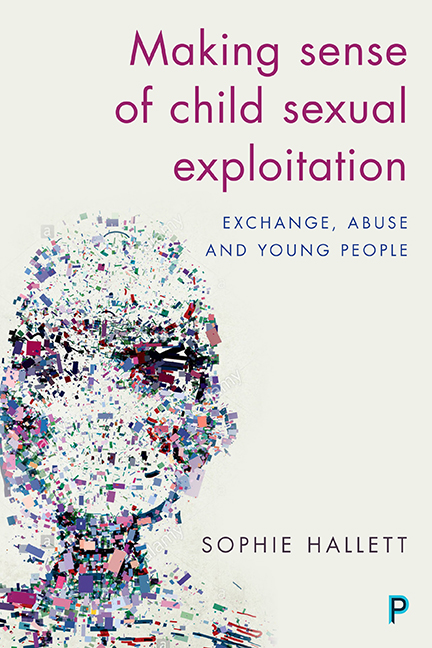Book contents
- Frontmatter
- Dedicaton
- Epigraph
- Contents
- Acknowledgements
- Introduction
- one From ‘child prostitution’ to ‘child sexual exploitation’: an overview
- two Vulnerabilities
- three Risk
- four Exchange and abuse
- five Responses, recognition and reciprocity
- Conclusion: child sexual exploitation – agency, abuse and exchange
- References
- Index
two - Vulnerabilities
Published online by Cambridge University Press: 05 April 2022
- Frontmatter
- Dedicaton
- Epigraph
- Contents
- Acknowledgements
- Introduction
- one From ‘child prostitution’ to ‘child sexual exploitation’: an overview
- two Vulnerabilities
- three Risk
- four Exchange and abuse
- five Responses, recognition and reciprocity
- Conclusion: child sexual exploitation – agency, abuse and exchange
- References
- Index
Summary
Vulnerable (adjective): exposed to the possibility of being attacked or harmed, either physically or emotionally.
(Oxford English Dictionary)This is the first of two chapters exploring the ways in which young people and professionals made sense of why sexual exploitation happens. In this chapter, attention is given to the wider context surrounding young people's experiences and why or how it is that some young people are vulnerable to being sexually exploited while others are not. ‘Vulnerability’, ‘risk’ and ‘how young people experience sexual exploitation’ are somewhat abstract and arbitrary as categories. Although analytically separable, and usefully so, they are interlinked and the boundaries between them are somewhat blurred. The distinction between these categories, however, reflects one made by both the young people and the professionals in the ways they made sense of child sexual exploitation; and it is a distinction made within policy and practice guidance too. As indicated in Chapter One, vulnerability and risk factors have been developed from research, and provide a way of enabling practitioners to ‘see’ sexual exploitation. They are the means by which professionals and practitioners working with children and young people can identify who may be at risk of CSE or experiencing it. Much of the attention within practice is on identifying and managing young people's ‘risk’ (primarily conceptualised as their risky behaviours) – something I turn to in Chapter Three. In so doing, these ‘factors’ also provide a narrative for explaining sexual exploitation, for they direct us towards an understanding of how and which young people come to be caught up in it.
The analysis here begins by exploring what the young people and professionals had to say about why they and others may be vulnerable to being sexually exploited. Many of the young people insisted that ‘it’ ‘could happen to anyone’; however, it will become clear throughout that not just anyone could be sexually exploited. The young people referred to ‘things going on’, to borrow a phrase from Katie, standing to mean the difficulties, situations and circumstances they had coped with or were in, which meant they were vulnerable to being taken advantage of.
- Type
- Chapter
- Information
- Making Sense of Child Sexual ExploitationExchange, Abuse and Young People, pp. 35 - 54Publisher: Bristol University PressPrint publication year: 2017



